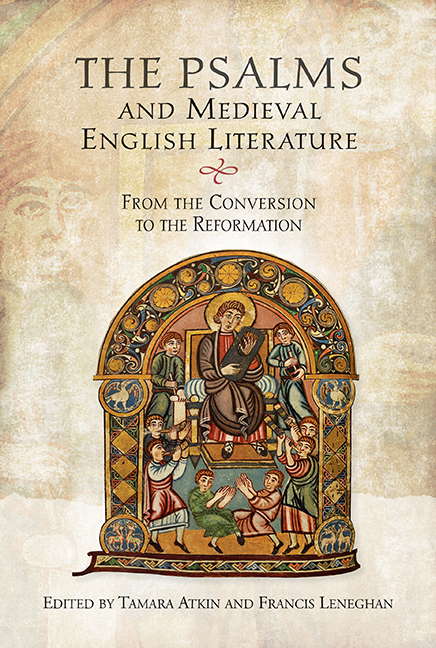Book contents
- Frontmatter
- Contents
- Figures
- Contributors
- Preface
- Acknowledgements
- Abbreviations
- Miscellaneous Frontmatter
- Introduction A Case Study of Psalm 50.13 in Old and Middle English
- I Translation
- II Adaptation
- 6 Making the Psalter Sing: the Old English Metrical Psalms, Rhythm and Ruminatio
- 7 The Psalms in the Old English Office of Prime
- 8 Psalm Genres in Old English Poetry
- 9 Articulating the Psalms in Middle English Alliterative Poetry: Some Passages of Piers Plowman, St Erkenwald and Pearl
- III Voice
- Index
9 - Articulating the Psalms in Middle English Alliterative Poetry: Some Passages of Piers Plowman, St Erkenwald and Pearl
from II - Adaptation
Published online by Cambridge University Press: 09 May 2017
- Frontmatter
- Contents
- Figures
- Contributors
- Preface
- Acknowledgements
- Abbreviations
- Miscellaneous Frontmatter
- Introduction A Case Study of Psalm 50.13 in Old and Middle English
- I Translation
- II Adaptation
- 6 Making the Psalter Sing: the Old English Metrical Psalms, Rhythm and Ruminatio
- 7 The Psalms in the Old English Office of Prime
- 8 Psalm Genres in Old English Poetry
- 9 Articulating the Psalms in Middle English Alliterative Poetry: Some Passages of Piers Plowman, St Erkenwald and Pearl
- III Voice
- Index
Summary
And Piers for pure tene pulled it [asonder]
And seide, 'Si ambulauero in medio vmbre mortis Non timebo mala quoniam tu mecum es.
I shal cessen of my sowyng‘, quod Piers, ’& swynke noȝt so harde,
Ne aboute my [bilyue] so bisy be na moore;
Of preieres and of penaunce my plouȝ shal ben herafter,
And wepen whan I sholde [werche] ϸouȝ whete breed me faille.
In the B-text of Piers Plowman, the Psalms are part of a dramatic juncture of conversion, as Langland's ploughman tears Truth's pardon in vexation, in one of the poem's most enigmatic and powerful moments. The ploughing of the half-acre which has occupied the poem for the last two passus, and which had seemed to be an act of communal labour which promised a way to ‘Truth’, is now abandoned and replaced with a ‘recheless’ alternative labour of penance inspired by a psalm image. Piers ‘voices’ Psalm 22.4 directly in Latin and then promises to imitate the penitential activity of Psalm 41.4, changing a concern with communal sustenance to a work of weeping personal contrition. He is not to return to the poem for over 3000 lines, as the explicator of the Tree of Charity during Will's ‘louedreem’ in passus16 (B16.20).
In this passage the Psalms are dynamic, active texts. In the words of a central work of scholarship on their appearance in Middle English writing, they are a kind of ‘prophetic song’, a powerful moral discourse that found both authority and penitential template in David's words and which joined ‘private’ penitential anguish with strident public and prophetic discourse. This image of the Psalms as used in Middle English writing brings with it an interest in a highly politicized, emotive and imitative use of psalm texts.
This essay does not focus on this commanding, vatic idea of psalm use. Instead, it redirects our attention towards the very mediated and exegetical way in which psalms are more regularly used in Middle English alliterative poetry. I follow the appearance of a small number of psalm texts (predominantly Psalms 14 and 23) as they occur in some Middle English poems. An important aspect of this analysis regards the process of rendering Vulgate text into Middle English verse, a process that, as Michael Kuczynski suggests, often blurs the practices of citation, translation, exegesis and paraphrase.
- Type
- Chapter
- Information
- The Psalms and Medieval English LiteratureFrom the Conversion to the Reformation, pp. 233 - 252Publisher: Boydell & BrewerPrint publication year: 2017

